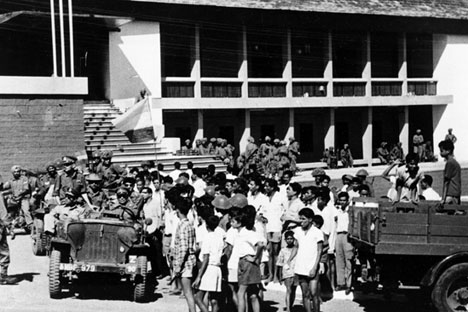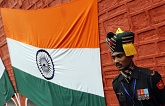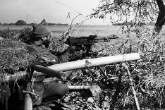Goa liberation: How Russia vetoed the West

Goanese local citizens gather to welcome Indian troops after the successful invasion of the former Portuguese colony, in Panjim, now Panaji, in 1961. Source: AP
The Portuguese were the first European colonisers to come to India and the last to leave. While the British were evicted in 1947, no action was taken against the Portuguese occupation of Goa until 1961 when an Indian military operation ended 450 years of foreign rule.
As former Goa chief minister Manohar Parikkar said last week, it was the indifference of independent India’s leaders that delayed Goa’s freedom. Typical of Jawaharlal Nehru’s cavalier attitude towards the country’s defence and security, India’s first prime minister did nothing. This was despite torture and killing of Indians and Goans involved in a small but spirited freedom movement in the enclave.
On one occasion in 1946, the Portuguese mercilessly beat up a group of Indian women who had organised a peaceful march through Goa. Not only were the women beaten in police custody but the Portuguese also threatened to strip naked the little daughters of the marchers.
Again, in 1955 when the Goa military shot dead 20 Goan and Indian liberation marchers, all Nehru did was institute a blockade, which the Portuguese regime evaded easily by flying supplies from Pakistan and Sri Lanka.
Six more years dragged on, with Nehru allowing this colonial sore to fester. He was concerned only about international opinion and did not want to break with his non-violent approach inherited from his mentor M.K. Gandhi. India’s strategic interests, the protection of Indian lives, and even the honour of Indian women were not at all a priority for Nehru. So what if the Portuguese were killing Indians. The followers of Gandhi mustn’t use force.
As the tension built up, Portuguese dictator Antonio Salazar sought help from the US, UK and other countries sympathetic to his cause. The British were reminded that under the terms of the 1899 Anglo-Portuguese Treaty they were obliged to come to Lisbon’s assistance if any Portuguese colony was attacked. US President John F. Kennedy – who had a few months earlier attempted an invasion of Cuba – wrote to Nehru, asking him not to use force.
In November 1961, emboldened by Nehru’s inaction, the Portuguese opened fire on Indian coastal steamers and fishing boats. Finally, on December 17, India mounted a military, naval and air attack on Goa using overwhelming force.
Global reactions
Western nations led the chorus of criticism against India. Leaders and official spokesmen in many countries, including the UK, US, Canada, Australia, New Zealand, France, the Netherlands, Spain and West Germany deplored the Indian action. So did Pakistan. On the other hand, India got the full support of Russia, Yugoslavia, the Arab States, Ghana, Sri Lanka and Indonesia.
The British were the first to come out all diplomatic guns blasting. On December 18, the Commonwealth Relations Secretary Duncan Sandys told the House of Commons: “Her Majesty’s government deeply deplore the decision of the Government of India to use military force to attain its political objectives.” “In addition,” he said, “we are particularly concerned about the wider repercussions which the action taken by the Indian Government may have upon other problems that face the world to-day.”
Here was British hypocrisy at its height. Just five years prior, Britain and France had jointly invaded Egypt to seize the Suez Canal.
China’s reaction was interesting. The Chinese Communist Government issued a statement on December 19 expressing “resolute support” for India's action in Goa, the Hong Kong Communist newspaper Ta Kung Pao (regarded as reflecting the views of the Chinese Government) described the attack on Goa as “a desperate attempt by Mr Nehru to regain his sagging prestige among the Afro-Asian nations”.
At the United Nations the US, UK, France and Turkey proposed a resolution condemning the Indian invasion. It called upon India to withdraw its forces immediately to “the positions prevailing before December 17, 1961”.
Moscow backs India
Moscow’s veto blew away the resolution. S.R. Sharma writes in India-USSR Relations – Volume 1: “The (Russian) veto saved India from a very awkward situation as the West was determined to get a ceasefire and withdrawal resolution passed in the Security Council.”
President Leonid Brezhnev, who was on a State visit to India at the time of the Goa crisis, said in Bombay on December 18 that Russia had “complete sympathy for the Indian people's desire to liberate Goa, Daman, and Diu from Portuguese colonialism.”
Brezhnev urged Indians to ignore Western indignation as it came “from those who are accustomed to strangle the people’s striving for independence…and from those who enrich themselves from colonialist plunder”.
Nikita Khrushchev sent a telegram to Nehru, saying that “the resolute actions of the Government of India to do away with outposts of colonialism in its territory were absolutely lawful and justified”. He said the Russian people “unanimously approve of these actions”.
Crossfire at the United Nations
Adlai Stevenson, the US representative at the UN, strongly criticised the Indian action. Invoking Gandhi, he said: “India is led by a man whom I regard as a friend –who has been a lifelong disciple of one of the world's great saints of peace – whom many have looked up to as an apostle of nonviolence – who only this year addressed the Assembly with a moving appeal for a UN year of international co-operation. These facts make the step which has been taken today (the attack on Goa) all the harder to understand and to condone.”
This is a typical reaction from Western governments, which want to box India within a peacenik framework, making sure India remains high on rhetoric and low on military power.
Moscow’s message
Valerian Zorin, Moscow’s permanent representative to the UN, said Russia stood by India in its fight for liberation from colonial domination.
He said the Goan question was entirely within India’s domestic jurisdiction and could not be considered by the Security Council. If discussion was necessary, however, the subject of discussion should be “the question of the violation by Portugal of the declaration on granting independence to colonial countries and peoples”. “Portugal does not fulfill and is not going to fulfill this declaration, and she is thereby creating a threat to peace and security in various parts of the world,” he said.
The Russian representative went on to say that neither Britain nor America had denounced Portugal when she was “annihilating scores of thousands of people in Angola”, nor had they suggested a cease-fire in Angola and the withdrawal of Portuguese troops from that territory and other Portuguese colonies. As soon, however, as “the question comes up of supporting the liberation from colonial dependence of peoples and territories which constitute an integral part of India, high-falutin pronouncements are immediately made of violations of the UN Charter….”
What’s remarkable about the liberation of Goa is that Portugal was a NATO member and yet the US and other NATO members failed to come to its rescue. And that happened at the height of the Cold War when NATO’s motto “an attack against one member is an attack on all” was taken in all seriousness. Clearly, the US was not prepared to risk Pittsburgh for Portugal.
All rights reserved by Rossiyskaya Gazeta.
Subscribe
to our newsletter!
Get the week's best stories straight to your inbox


